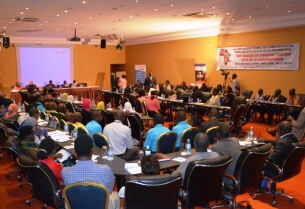Faith leaders from across the continent met at the Commonwealth Resort in Munyonyo, Kampala, Uganda for the African Faith Leaders’ Summit on 1st and 2nd July 2014.
The summit was hosted by the Inter-Religious Council of Uganda with support from the Government of Uganda and ran under the theme: Enhancing Faith Communities’ Engagement on the Post-2015 Development Agenda.
It was attended by the Council of Anglican Provinces of Africa and a host of religious, inter-religious and ecumenical regional bodies from the continent, and aimed to scale up the engagement of faith communities and faith leaders in shaping the post-2015 development agenda.
A pre-summit conference for women, youth, children, persons with disability and persons living with HIV/AIDS was held on the day preceding the Summit. This preconference was organised to provide a platform for these constituencies to reflect upon and articulate their unique needs and concerns pertaining to sustainable development and the post-2015 framework.
Dr Elly Macha from the Ecumenical Disability Advocacy Network expressed the status of persons with disabilities over the years. She said that disability was an issue that needed attention, and it was unfortunate that it was excluded from the MDGs.
Dr Macha said, “Disability creates poverty and poverty leads to disability, we want to make sure our voice is not left out in the post-2015 agenda”.
The youth expressed their desire for the post-2015 agenda to offer more opportunities for economic empowerment, while women representatives sent a strong message to African faith leaders to ensure their inclusion and a sense that they ‘belonged’ to the process.
The Summit was officially opened by Ugandan President, H.E. Yoweri Kaguta Museveni. In his opening remarks, President Museveni affirmed the responsibility man has over creation according to the biblical account in the book of Genesis. He strongly urged religious tolerance among the different faiths and a dedication to service based on the story of the Good Samaritan as a way of attaining sustainable development.
At the conclusion of the Summit, the faith leaders released a position paper and a final statement, which are linked below. The position paper was inspired by the Common Africa Position (CAP), which outlines the Africa Union Position, among other frameworks.
A follow-up programme of action will present African faith leaders with the opportunity to engage African governments and regional integration bodies both on the Summit resolutions and the broader global debates.
The leaders were in agreement on the need to integrate the monitoring of national planning, implementation and accountability in the post-2015 agenda to ensure that the aspirations expressed in the position paper are realised.
At the close of the Summit, participants listened to the President of Liberia, H.E Ellen Johnson Sirleaf, who is co-chair of the UN High Level Panel for the post-2015 agenda. She spoke in a message of solidarity and goodwill via a video link.
The Summit was organised by religious, inter-religious and ecumenical regional bodies including:
The African Council of Religious Leaders, The Symposium of Episcopal Conferences of Africa and Madagascar, All Africa Council of Churches, The Organization of African Instituted Churches, The Hindu Council of Africa, The Council of Anglican Provinces of Africa, The Union of Muslim Councils of Central, Eastern and Southern Africa, The Spiritual Assembly of the Baha’i, Arigatou International, The Fellowship of Christian Councils and Churches in the Great Lakes and Horn of Africa and The Association of Evangelicals of Africa.
African faith leaders documents:

